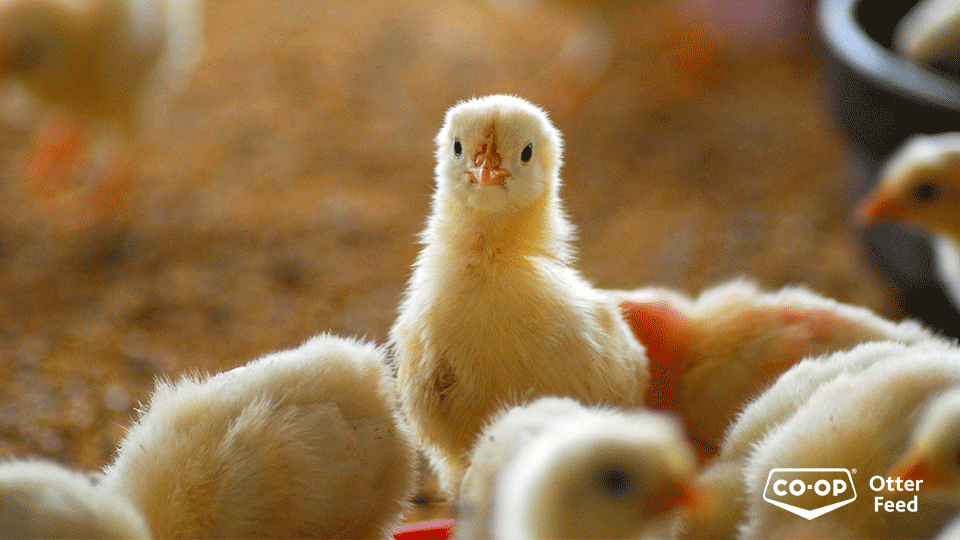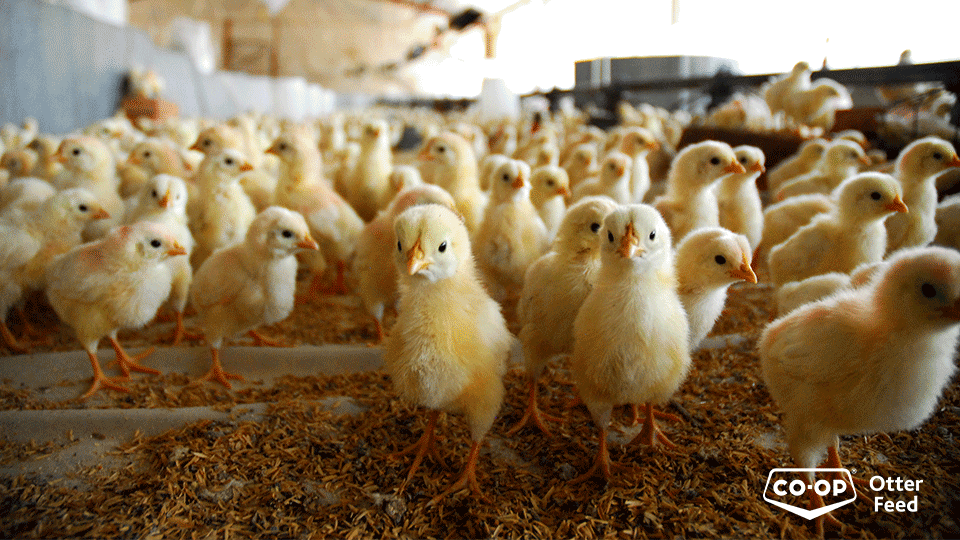Keeping birds warm is extremely important during the winter
 Keeping birds warm is extremely important during the winter
Keeping birds warm is extremely important during the winter
Keeping birds warm is extremely important during the winter. Your Otter Co-op Feed and Pet team can help suggest the perfect diet, assuring they receive increased nutritional requirements to keep warm, and higher protein to help manage the cold stress. Our Natures Mix shavings for the coop and our Pegasus straw for nesting boxes will also help keep your birds cozy in the cool weather.
We asked our team of experts for some additional tips to keep your coop warm and healthy during these cold winter months.
Chicks of all the species should be on 24 hours light for the first 3 to 7 days. This will ensure that they will find and consume adequate water and feed.

Broiler Chicks, Turkeys, Pheasants, Quail and Guinea Fowl: Provide light for 16 to 20 hours per day. If possible reduce gradually to 16 hours by 14 days of age. Increase the light period gradually again for more rapid growth.
Layer Chicks: Due to the importance of the changing day-length in the spring lighting programs for layer or breeding birds need to mimic these conditions in confinement situations. Start chicks at 24 hours of light for 3 - 7 days. Gradually reduce the period of light to about 10 hours a day by 8 weeks. Keep this length of day until the birds are 18 - 20 weeks, or until they are large enough to begin lay at which time you should gradually increase light to a minimum of 14 – 16 hours. Never decrease the length of the light period if you wish to keep your birds in top egg production. Healthy birds should lay well for more than a year, although the number of eggs will gradually reduce over time.
Litter Management
Provide 10 to 15 cm (4 to 6 inches) of litter on the floor of the brooding and rearing area. Untreated and dry shavings are easy to manage and absorbent. Be sure the floor is dry before the bedding is added. Keep the bedding dry during the growing period, especially around the waterers. A daily stirring of the bedding material helps to air and dry it. Remove any caked bedding under waterers etc. Adequate ventilation is important for air quality (keeps ammonia levels down) and for litter quality (helps to dry litter). If you have a flock of 50 or more birds in a confined area, consider installing a ventilation fan. This will keep the air ammonia free and the litter dry. Good litter management is an important way to reduce stress and disease in the birds, since wet litter is a major source of disease problems in poultry barns.
Temperature
The temperature needed for the birds will change over time. For young chicks, a temperature a bit on the warm side is better than too cool. Broiler or layer chicks should be brooded in a draft free area where the temperature is between 32 and 35 degrees Celsius (90 to 95 degrees Fahrenheit). Have the brooding area up to the required temperature at least one day prior to the arrival of the chicks. This will ensure that the floor and litter are also at the correct temperature and any moisture is removed. Temperatures can be reduced to 22 to 25 degrees Celsius by 28 days if the birds are well feathered. If chicks huddle around the brooder or heat lamp they are too cold. If they tend to circle the heat source rather than go under it, then it is too warm for comfort. Keep a thermometer at floor level in order to assure yourself of the correct bird-level temperature.

Receiving the Chicks
Chicks should be received in good condition. Birds held without feed or water for several days will be weakened and mortality in the first 10 days will be higher than normal. Early mortality of 1% or 2% is normal. Be sure that chicks have easy access to plenty of water for 3-4 hours prior to introducing feed especially if chicks are under stress from transport etc. Feed should be offered in low, flat containers that make it visible and accessible. Because chicks walk on the feed at this point, be sure to change feed daily to keep it fresh and uncontaminated. Self-feeders can be used by the end of the first week, since the birds will have found them by then and they will be more active. Keep chicks, heat-source, feed and water in a small area at first to ensure that the essentials for life are always close by. The use of a small room or using a cardboard ring around them works well.
Disease
Sick birds don't eat well and extra heat may be beneficial. If they do not look and act better after a day or two, or the droppings are very loose wet, or bloody, consider the need for a water soluble medication. Ask your veterinarian or feed company for advice and medicate appropriately. Although coccidiosis is the most common poultry disease of young birds, other problems include omphallitis (navel infection in chicks) and diseases including enteritis, bronchitis, Newcastle disease, Marek's disease, chronic respiratory disease, cores, and E.coli infections and blackhead (in turkeys). Chicks can be vaccinated for some of these more common diseases at the hatchery so inquire as to what diseases are common in your area and what the hatchery has vaccinated for. Remember waterers need to be kept clean at all times to help prevent disease. Chlorinated water helps keep disease in check. Chicks that are weak when received can be supplemented with water soluble vitamins.
Feeder Space
A general rule of thumb for feeder space is to provide 5 cm (2 inches) of space per mature bird. One-half of that space is recommended for young birds. Feeding free-choice is appropriate for most situations except when breeder birds are being kept. Breeding birds should not be over-weight, so feed intake should be limited to keep them in the proper condition. Weighing the birds from time to time is a good idea for breeding stock, as is probing under the feathers to assess the degree of fatness. Remember, the fullness of the feathers can be deceiving. Obtain a weight chart from the variety or species you want to raise to be sure of your target weights.
For additional tips and questions, please visit our Otter Co-op Feed location in Langley and speak to our experts for what's best for your coop.